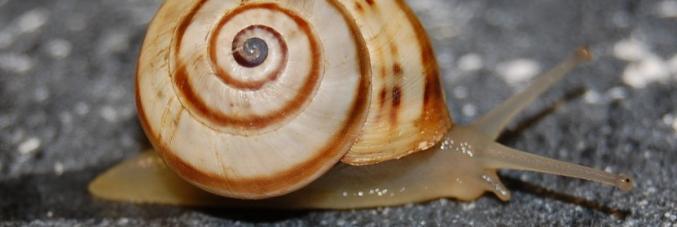
The numerical skills of a snail: selecting a place in the shade to ensure survival
11.03.2021
A study recently published in Scientific Reports entitled Continuous versus discrete quantity discrimination in dune snail (Mollusca: Gastropoda) seeking thermal refuges is the work of Elia Gatto of the Department of Developmental Psychology and Socialisation and Angelo Bisazza of the Department of General Psychology both from the University of Padua. The work demonstrates how sophisticated cognitive abilities can evolve in animals with simple nervous systems, given that such abilities are advantageous in terms of survival.
Research conducted over the past fifteen years has documented how numerical abilities are widely spread in mammals, birds, and fish. Such abilities provide ecological advantages affecting important functions such as locating food, selecting social groups or breeding. Sophisticated cognitive abilities, such as numerical abilities, were considered limited only to animals with complex nervous systems. As such, little attention was given to the study of this function in invertebrates since these abilities were only thought to occur as a response or as a reflex to environmental stimuli.
“Our research investigates the capabilities of the dune snail Theba pisana, to discriminate between groups of different numbers. The ecology of this species is of particular interest. The Theba pisana snail lives in dune areas considered hostile environments with scarce vegetation and high soil temperatures. To reduce the risk of dehydration, the dune snail actively seeks out the few bushes available to climb and escape the adverse conditions. Elia Gatto explains, “Not finding adequate shelter on sunny days would almost inevitably lead to the death of the snail. This situation is a selective force that may have favoured the evolution of this species with an elaborate cognitive mechanism that allows them to select a more favourable refuge. In the laboratory, we exploited this "refuge search" behaviour to study the numerical discrimination capabilities in the dune snail.”
The dune snail, Theba pisana, is a small mollusc that lives in inhospitable habitats characterized by sparse vegetation and daytime soil temperatures exceeding 70°F (21°C), such temperatures are well above the thermal tolerance of this species. Dune snails are active at night, therefore each day at dawn they must search and climb the few herbaceous stems available to escape the adverse conditions in order to survive. Not all stems are suitable shelters, and as such, researchers assumed that dune snails would prefer to seek out a wide range of shelters to increases the likelihood of finding a suitable refuge. Researchers replicated this behaviour under controlled laboratory conditions by giving each subject the possibility to choose between two groups of shelters placed at equal distances. The snails showed a high level of accuracy in discriminating between quantities similar to that observed in mammals and birds.
In a subsequent series of experiments, researchers sought to verify whether the snails actually used numerical information or if they based their decisions on other clues, such as the cumulative surface of stems or stem density. The results obtained indicate that in all probability dune snails hold real numerical capacities such as those found in vertebrates.
'The results suggest that sophisticated cognitive abilities can evolve in animals with a very simple nervous system when such abilities merit strong survival advantages. Elia Gatto concludes, “Gastropods (snails) are able to learn in an associative way and making it possible to study their ability to discriminate between shelters using learning paradigms similar to those used in the study of vertebrates.”



